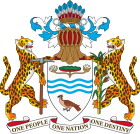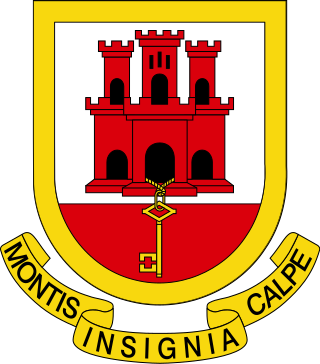 |
|---|
| Constitution |
The Legislature was the parliament of British Guiana between 1961 and 1964. A bicameral body, it consisted of an appointed Senate and an elected Legislative Assembly.
 |
|---|
| Constitution |
The Legislature was the parliament of British Guiana between 1961 and 1964. A bicameral body, it consisted of an appointed Senate and an elected Legislative Assembly.
A new constitution was promulgated on 18 July 1961, replacing the unicameral Legislative Council with the legislature. The new body consisted of a 13-member Senate and a 36-member Legislative Assembly. [1] The 13 members of the Senate were nominated, with eight nominated by the ruling party, three by the opposition and two by the Governor. [2] Of the 36 Legislative Assembly members, 35 were elected in single-member constituencies, and the elected MPs then elected a Speaker. [1]
Elections to the new Legislature were held on 21 August 1961. Both houses convened for the first time on 5 October 1961, when members elected Rahman Gajraj as Speaker of the Legislative Assembly and Ashton Chase as President of the Senate. [1]
Further constitutional amendments in 1964 scrapped the legislature, replacing it with a unicameral House of Assembly. The legislature was dissolved on 25 September 1964. [1]

A senate is a deliberative assembly, often the upper house or chamber of a bicameral legislature. The name comes from the ancient Roman Senate, so-called as an assembly of the senior and therefore considered wiser and more experienced members of the society or ruling class. However the Roman Senate was not the ancestor or predecessor of modern parliamentarism in any sense, because the Roman senate was not a de jure legislative body.

A member of parliament (MP) is the representative in parliament of the people who live in their electoral district. In many countries with bicameral parliaments, this term refers only to members of the lower house since upper house members often have a different title. The terms congressman/congresswoman or deputy are equivalent terms used in other jurisdictions. The term parliamentarian is also sometimes used for members of parliament, but this may also be used to refer to unelected government officials with specific roles in a parliament and other expert advisers on parliamentary procedure such as the Senate parliamentarian in the United States. The term is also used to the characteristic of performing the duties of a member of a legislature, for example: "The two party leaders often disagreed on issues, but both were excellent parliamentarians and cooperated to get many good things done."
Bicameralism is a type of legislature that is divided into two separate assemblies, chambers, or houses, known as a bicameral legislature. Bicameralism is distinguished from unicameralism, in which all members deliberate and vote as a single group. As of 2022, roughly 40% of the world's national legislatures are bicameral, while unicameralism represents 60% nationally and much more at the subnational level.
Unicameralism is a type of legislature consisting of one house or assembly that legislates and votes as one. Unicameralism has become an increasingly common type of legislature, making up nearly 60% of all national legislatures and an even greater share of subnational legislatures.

The speaker of a deliberative assembly, especially a legislative body, is its presiding officer, or the chair. The title was first used in 1377 in England.

The Gibraltar Parliament is the legislature of the British overseas territory of Gibraltar. Between 1969 and 2006, it was called the Gibraltar House of Assembly.

The Parliament of Pakistan is the supreme legislative body of the Islamic Republic of Pakistan. It is a bicameral federal legislature, composed of the President of Pakistan and two houses: the Senate and the National Assembly. The president, as head of the legislature, has the power to summon or prorogue either house of the Parliament. The president can dissolve the National Assembly, only on the Prime Minister's advice.

Elections in Guyana take place within the framework of a multi-party representative democracy and a presidential system. The National Assembly is directly elected, with the nominee of the party or alliance that receives the most votes becoming President.

The Parliament of Zimbabwe is the bicameral legislature of Zimbabwe composed of the Senate and the National Assembly. The Senate is the upper house, and consists of 80 members, 60 of whom are elected by proportional representation from ten six-member constituencies corresponding to the country's provinces. Of the remaining 20 seats, 18 are reserved for chiefs, and two for people with disabilities. The National Assembly is the lower house, and consists of 280 members. Of these, 210 are elected from single-member constituencies. The remaining 70 seats are reserved women's and youth quotas: 60 for women; 10 for youth. These are elected by proportional representation from ten six-member and one-member constituencies respectively, corresponding to the country's provinces.

The National Assembly of Malawi is the supreme legislative body of the nation. It is situated on Capital Hill, Lilongwe along Presidential Way. The National Assembly alone possesses legislative supremacy and thereby ultimate power over all other political bodies in Malawi. At its head is the Speaker of the House who is elected by his or her peers. Since June 19, 2019, the Speaker is Catherine Gotani Hara.

The Supreme Council is the unicameral parliament of the Kyrgyz Republic. It was known as the Supreme Soviet of the Kirghiz Soviet Socialist Republic until 1991.

The Constitution of the Democratic Socialist Republic of Sri Lanka has been the constitution of the island nation of Sri Lanka since its original promulgation by the National State Assembly on 7 September 1978. As of October 2022 it has been formally amended 21 times.

The Constitution of Guyana is the highest governing document in the Republic of Guyana. It came into effect on October 6, 1980, replacing the constitution enacted in 1966 upon its independence from the United Kingdom. The current Constitution of Guyana contains 12 chapters that are further divided into 232 articles. It also contains a preamble and an oath. Since its 1980 enactment, it has gone through multiple amendments.

The Tamil Nadu Legislative Assembly is the unicameral legislature of the Indian state of Tamil Nadu. It has a strength of 234 members, all of whom are democratically elected using the first-past-the-post system. The presiding officer of the Assembly is the Speaker. The term of the Assembly is five years, unless dissolved earlier.

General elections were held in British Guiana on 21 August 1961. The result was a victory for the People's Progressive Party, which won 20 of the 35 seats.

The Legislative Council was the legislature of British Guiana between 1928 and 1953 and again from 1954 until 1961.

The House of Assembly was the legislature of British Guiana in the 1950s and 1960s.

The Senate was the upper house of the Legislature in British Guiana between 1961 and 1964.

The Legislative Assembly was the lower house of the Legislature in British Guiana between 1961 and 1964.